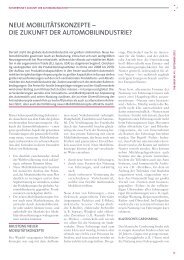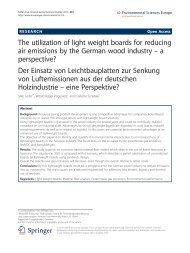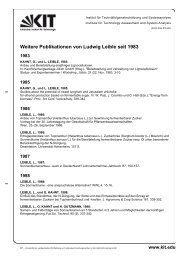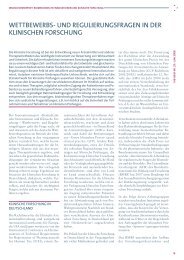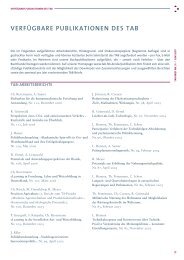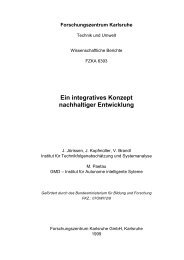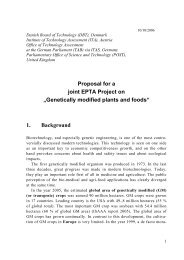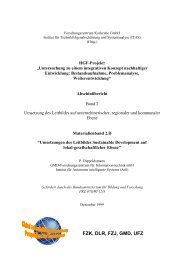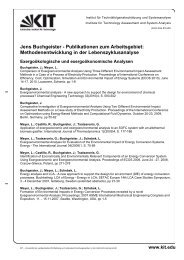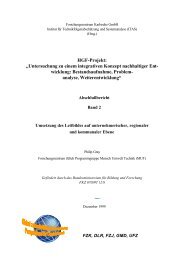Results: RFID and Identity Management in everyday life - ITAS
Results: RFID and Identity Management in everyday life - ITAS
Results: RFID and Identity Management in everyday life - ITAS
Create successful ePaper yourself
Turn your PDF publications into a flip-book with our unique Google optimized e-Paper software.
Case #61: Transport for London (Oyster card)<br />
Case ID 61, level 1<br />
Title Transport for London (Oyster card)<br />
Researcher Christian van ‘t Hof/ Sil Wijma<br />
Tim<strong>in</strong>g 2002-2006<br />
Geography London, UK<br />
Environment Public transport<br />
Technology Philips Semiconductors’ MIFARE St<strong>and</strong>ard 1 Kbyte ICs <strong>in</strong> G&D <strong>and</strong> SchlumbergerSema cards<br />
[3]<br />
Maturity Fully operational<br />
Function Payment<br />
Owner Transport for London, TranSys<br />
Ma<strong>in</strong>ta<strong>in</strong>er Who ma<strong>in</strong>ta<strong>in</strong>s the database <strong>and</strong> readers?<br />
Users Who uses the <strong>RFID</strong> tags to move through the environment<br />
Other actors TranSys (consortium of Cubic, EDS, Fujitsu <strong>and</strong> WS Atk<strong>in</strong>s), Transport for London (TfL) <strong>and</strong><br />
London Underground Limited (LUL)<br />
Case story The Oyster card is a <strong>RFID</strong>-card for public transport <strong>in</strong> London. It can be used on tra<strong>in</strong>s, trams,<br />
busses, metro <strong>and</strong> Dockl<strong>and</strong>s Light Railway (DLR). A Travelcard or Bus Pass season ticket can<br />
be loaded on it, as well as travel value (cash) to pay as you go [1]. Reload<strong>in</strong>g is possible via<br />
ticket offices <strong>and</strong> mach<strong>in</strong>es, over the Internet <strong>and</strong> by telephone [1]. In London there are nearly<br />
seven million bus <strong>and</strong> Underground journeys every day [3]. The Oyster card was <strong>in</strong>troduced <strong>in</strong><br />
August 2002 for staff [3]. Us<strong>in</strong>g a Oyster card to ‘pay as you go’ is cheaper than buy<strong>in</strong>g paper<br />
tickets [2]. The ‘pay as you go’ service was <strong>in</strong>troduced <strong>in</strong> January 2004 [2].<br />
Over 5 million people use a Oyster card [4].<br />
A refundable deposit of a little over €4,- has to be paid when purchas<strong>in</strong>g a Oyster card (unless<br />
at least a monthly ticket is loaded to the card). Without registration the Oyster card is restricted<br />
<strong>in</strong> such a way that only ‘pay as you go ‘<strong>and</strong> weekly tickets can be loaded [2]. The ‘pay as you<br />
go’ service is not available on all public transportation <strong>in</strong> London; now most railroads <strong>in</strong> London<br />
do not use the Oyster system. In 2008 this should be the case. A 'capp<strong>in</strong>g' system was<br />
<strong>in</strong>troduced on 27 February 2005, which guarantees that an Oyster card user will be charged no<br />
more than the cheapest comb<strong>in</strong>ations of s<strong>in</strong>gle tickets, travelcards <strong>and</strong>/or bus pass that cover<br />
all journeys made that day. [2].<br />
Although there have been different plans to use the Oyster card for small payments [6] TfL now<br />
says it is to complex to realise this [].<br />
Due to a malfunction<strong>in</strong>g of the system it has been out of use for one morn<strong>in</strong>g [7]. Another bug<br />
made travell<strong>in</strong>g impossible for some cardholders for some time [2, 8].<br />
ID issue When purchas<strong>in</strong>g the Oystercard, full personal detailes are required [11]<br />
The police <strong>in</strong> very <strong>in</strong>terested <strong>in</strong> us<strong>in</strong>g the journey data that is stored from travellers who use the<br />
Oyster card. The number of request from the police has risen from seven <strong>in</strong> 2004 to 61 requests<br />
made <strong>in</strong> January 2006 alone [4].<br />
A spokesman of TfL said: "Transport for London complies fully with the Data Protection Act.<br />
Information on <strong>in</strong>dividual travel is kept for a maximum of eight weeks <strong>and</strong> is only used for<br />
customer service purposes, to check charges for particular journeys or for refund <strong>in</strong>quiries. "A<br />
very few authorised <strong>in</strong>dividuals can access this data <strong>and</strong> there is no bulk disclosure of personal<br />
data to third parties for any commercial purposes. There is no bulk disclosure of personal data<br />
to any law enforcement agency. If <strong>in</strong>formation is disclosed, it is always done so <strong>in</strong> accordance<br />
with the Data Protection Act after a case-by-case evaluation. [4].<br />
63



